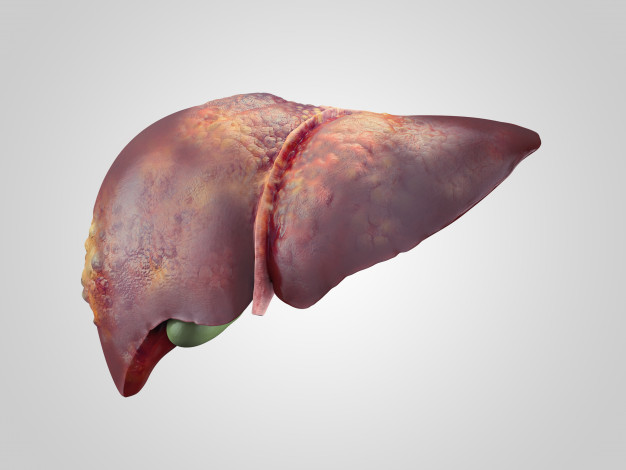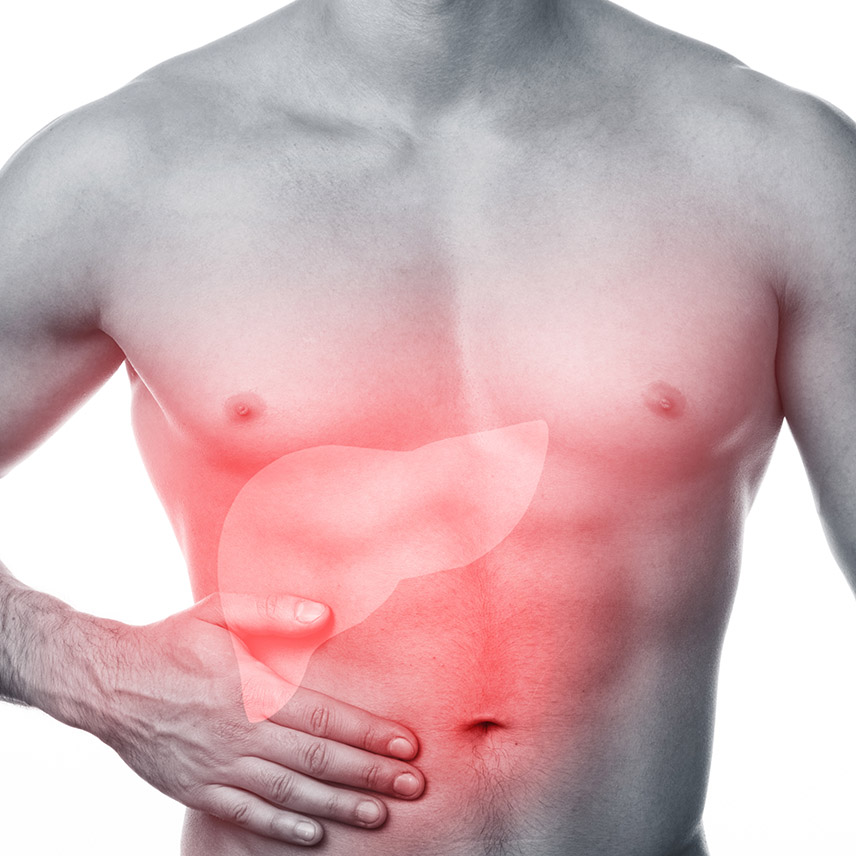Fatty Liver
What is Fatty Liver
The liver is the largest solid internal organ in the body which helps the body digest food, store energy and filter harmful substances from the blood. Fatty Liver Disease, also known as Hepatic Steatosis is a medical condition defined by the excess accumulation of fat in this ever important organ.
Fatty Liver Disease is slowly turning into a “Silent Epidemic” fueled by economic evolution which has no doubt improved the quality of life but has also drastically affected the way of life leading to Sedentary lifestyles, Obesity and increased incidence of metabolic syndrome of which Fatty Liver Disease is often associated with. It is therefore of utmost importance, the early detection and prevention of Fatty Liver, and treatment before permanent damage because, if the condition of Fatty Liver isn’t addressed, it can progress to other serious hepatic complications.
Need to consult our dietitian for the best fatty liver management programme?
Quickly Book an Appointment.

Types of Fatty Liver Diseases
There are two main types of Fatty Liver Diseases which are the most common causes of chronic liver diseases in both developing and developed countries.
They are:
Non Alcoholic Fatty Liver Disease (NAFLD)
- Alcoholic Fatty Liver Disease (Also known as Alcoholic Steatohepatitis) (AFLD)
- Non Alcoholic Fatty Liver Disease (NAFLD)
NAFLD is a type of Fatty Liver Disease which is not associated with or caused by heavy alcohol consumption.
There are two different kinds:
- Simple Fatty Liver:Also known as Non-Alcoholic Fatty Liver (NAFL). It is defined by the accumulation of fat in the liver but, without the presence of inflammation or liver cell damage. This does not typically progress to cause liver damage or its associated complications. Generally, most people with NAFLD have simple Fatty liver and it is a non-serious condition.
- NASH (Non Alcoholic Steatohepatitis) : It is a form of NAFLD which is characterised by inflammation of the liver and liver cell damage in addition to accumulation of excess fat in the liver. NASH can lead to other serious hepatic medical conditions such as fibrosis or scarring of the liver, liver Cirrhosis and liver cancer. Around 20% of people with NAFLD have NASH and if left untreated, can succumb to death.
Alcoholic Fatty Liver Disease (AFLD)
There are three stages of Alcohol related Liver Disease (ARLD):
- Alcoholic Fatty Liver Disease (AFLD):It is characterised by liver damage associated with years of heavy alcohol consumption i.e., more than 14 drinks/week for men and more than 7 drinks/week for women. This is the first stage of ARLD and is generally curable by quitting alcohol abuse.
- Acute Alcoholic Hepatitis: This stage is defined by inflammation or swelling of the liver caused by years of alcohol abuse. This swelling can further cause fever, nausea, vomiting, abdominal pain and jaundice.
- Alcoholic cirrhosis: This is the most severe form of ARLD and is caused as a result of buildup of scar tissue in the liver. At this stage, damage is irreversible and can ultimately lead to liver failure.
If you’re suffering from any of these diseases, please get in touch with us for the best fatty liver management programme.
Risk Factors
Causes and Risk factors of Non Alcoholic Fatty Liver Disease (NAFLD)
The underlying cause of NAFLD is still unclear. Research suggests that certain health conditions make one more prone or likely to develop NAFLD or NASH, such as:
- Have a family history of Fatty liver Diseases
- Genetic disposition
- Overweight or Obesity
- Presence of Insulin resistance
- Elevated levels of cholesterol in the blood
- Have metabolic syndrome or have one or more different traits of metabolic syndrome which is defined as a cluster of medical conditions linked to overweight and obesity. According to the latest research, NAFLD may be closely associated with metabolic syndrome.
- Diagnosed with Type II Diabetes
- Diagnosed with PCOS
- Are pregnant
- Poor nutrition
For the best PCOS fatty liver diet or any of the conditions mentioned above, please get in touch with out nutritionists. They are certified and can guide you throughout your journey.
Other less common causes include:
- Rapid weight loss disorders that cause your body to use or store fat improperly
- Infections such as hepatitis C
- Exposure to certain toxins
- Side effects from certain medications such as
- Amiodarone
- Diltiazem
- Glucocorticoids
- Methotrexate
- Synthetic estrogens
- Tamoxifen
- Valproic acid
Causes and Risk factors of Alcoholic Fatty Liver Disease (AFLD)
One definite cause of Alcoholic Fatty Liver Disease (AFLD) is alcohol abuse over a period of years. During the body’s breakdown of alcohol, Acetaldehyde, a toxic chemical is produced which damages the liver and causes liver scarring and inflammation/scarring in some. Therefore, not all regular drinkers develop AFLD. It is unclear as to why AFLD affects some people whilst others remain unaffected.
Risk factors
- Family history
- Often consume alcohol heavily : Women who consume more than 2-3 drinks and men who consume more than 4-5 drinks everyday for more than a period of 5 years are at a greater risk.
- Poor nutrition
- Having Hepatitis C
- Genetic changes in particular enzymes which are involved in alcohol metabolism
Signs and Symptoms
In cases of both Non Alcoholic Fatty Liver Disease (NAFLD) and Alcoholic Fatty Liver Disease (AFLD), there are generally no noticeable signs and symptoms, but initial signs could be feeling of tiredness or pain in the upper ride side of the belly where the liver is located, nausea and vomiting, diarrhea and decreased appetite.
Once any condition of Fatty Liver Disease progresses, the more distinctive symptoms can include:
- Jaundice
- Swelling (edema) of the lower limbs
- Swollen belly/
- Ascites (buildup of fluid in the abdomen)
- Fever coupled with shivering
- Itchy skin
- Clubbed fingernails (excessively curved fingernails)
- Extreme loss of weight
- Muscle wasting and weakness
- Bloody stools and vomit
- Bruising and bleeding more easily
- Sensitive reaction to alcohol and drugs
Diagnosis
It is difficult to diagnose Fatty Liver Disease conditions since most people don’t exhibit any initial signs and symptoms. However, there are several tests to find out if there is any existing hepatic condition.
The different diagnostic tools available are:
- Health history: Doctors can ask about any previous or current history of alcohol abuse which can help the doctor to distinguish if one may have ALD or NAFLD. Other necessary questions that can be asked are the medications benign taken if any, diet and lifestyle history, and about other persisting medical conditions.
- Physical exam: Body weight is checked and the body is physically examined for signs of any liver problems such as jaundice or an enlarged liver.
- Blood tests: Done to determine if there are elevated levels of liver enzymes and other blood parameters such as:
- Complete blood count (CBC)
- Liver enzyme and liver function tests
- Celiac disease screening test
- Tests for checking chronic viral hepatitis (such as hepatitis A, hepatitis C and others)
- Fasting blood sugar (Fbs)
- Hemoglobin A1C (HBA1C)
- Lipid profile
- Imaging tests: These tests help to determine if there is any accumulation of fat in the liver.
The different tests are:
- Abdominal ultrasound,
- Computerized tomography (CT) scanning
- Magnetic resonance imaging (MRI)
- Transient elastography
- Magnetic resonance elastography
- Liver biopsy: In this method, a sample of the liver tissue is removed to be examined to look for signs of inflammation or scarring.
Prevention and Treatment
There are currently no drug treatments available and approved by the FDA for the treatment of Fatty liver Diseases. Therefore, there is great emphasis on adoption of a balanced diet plan and positive lifestyle changes to achieve healthy weight loss as the first line of treatment. Ideally losing 10% of current body weight is desirable, but there is apparent improvement in risk factors even with 3-5% of weight loss.
For those diagnosed with cirrhosis, liver transplant is an option.
Some lifestyle changes that can help, are:
- Limiting or quitting alcohol consumption to prevent further damage to the liver.
- Losing weight
- Choosing a healthy diet composed of fruits, vegetables and whole grains.
- Being physically active: Exercising for even a minimum of 30 minutes on most days of the week can be helpful.
- Maintaining optimum blood sugar and cholesterol levels
- Fatty liver disease: Alcoholic and non-alcoholic types. (2009, July 14). Retrieved from https://www.webmd.com/hepatitis/fatty-liver-disease
- Nonalcoholic fatty liver disease – Diagnosis and treatment – Mayo Clinic. (2019, August 22). Retrieved from https://www.mayoclinic.org/diseases-conditions/nonalcoholic-fatty-liver-disease/diagnosis-treatment/drc-20354573
- The Healthline Editorial Team. (n.d.). Everything you need to know about fatty liver. Retrieved from https://www.healthline.com/health/fatty-liver#prevention
Food & Wellness | Fatty Liver Management Programme
At Food & Wellness, the diet plans are tailor made and customised by an expert panel of Dietitians to ensure that the progression of the above existing medical conditions are slowed down and overall health parameters are gradually improved over the course of time.
In detail discussion of your Dietary and lifestyle habits along with scientific analysis of blood reports is done to further support the holistic management and treatment of disease ailments.
Through the Fatty Liver Disease management program, we aim to positively improve the blood parameters by significantly decreasing the initial body weight, fasting and post prandial blood sugar levels, cholesterol levels through provision of easy to follow and flexible dietary and lifestyle recommendations with key emphasis on suggesting a variety of food options to break the cycle of meal monotony.
Post conclusion of the program, maintenance diet plans are assigned to encourage adoption of healthy eating principles and of inculcating a nourishing and healthy lifestyle, all of which are taught during the course of the program.
Whether you need a holistic PCOS diet plan or a comprehensive fatty liver management programme, reach out to us. We are serving not just in Kolkata, Delhi, Mumbai, or Bangalore but also Dubai and Singapore.
This advocates and ensures that the individual remains healthy throughout life.

Let's get started with treating your condition...
At Food & Wellness we believe that every individual is different and needs special attention. We adapt our programme to your existing lifestyle and try not to change anything drastically so you can easily transition. Over a period of time we ensure results and help you restore your health.
Fatty Liver Articles

The Sizzling Benefits of Healthy Grilling in the Summer
Discover the sizzling benefits of healthy grilling in the summer! Grilling isn’t just about indulgence; it can be a nutritious cooking method too. Learn how grilling helps reduce fat content, retain essential nutrients, intensify flavors, and promote healthier cooking techniques. Fire up the grill and embrace the goodness of flavorful and healthy meals this summer! #HealthyGrilling #SummerDelights #FlavorfulNutrition

The Mediterranean diet: Advantages and Disadvantages
The Mediterranean diet has been touted as one of the healthiest diets in the world. It is a diet that is rich in fruits, vegetables, whole grains, legumes, nuts, and olive oil, and low in red meat, processed foods, and added sugars. This diet is based on the traditional eating patterns of the Mediterranean region, where people are known for their longevity and low rates of chronic diseases. In this blog, we will explore the advantages and disadvantages of the Mediterranean diet.

How to boost your Metabolism?
Metabolism describes all the chemical reactions in your body that keep one’s body alive and functioning. Metabolism is also responsible for converting nutrients from the foods you eat into fuel. This provides your body with the energy it needs to breathe, move, digest food, circulate blood, and repair damaged tissues and cells. However, Metabolism is


